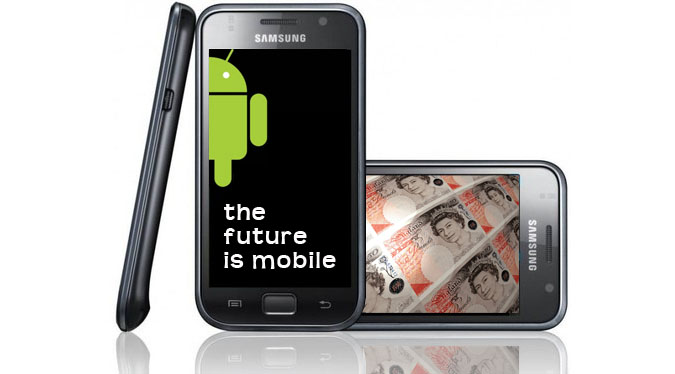Craig Charley
12 Dec 2011
The Mobile App Revolution - How Shops Are Competing With Apps
The way we shop is changing forever due to Mobile Apps. New technology is blurring the lines between traditional bricks and mortar shopping and internet shopping and making it more important than ever for businesses to embrace the mobile revolution. A developer last Wednesday uploaded the one millionth mobile app to the market.
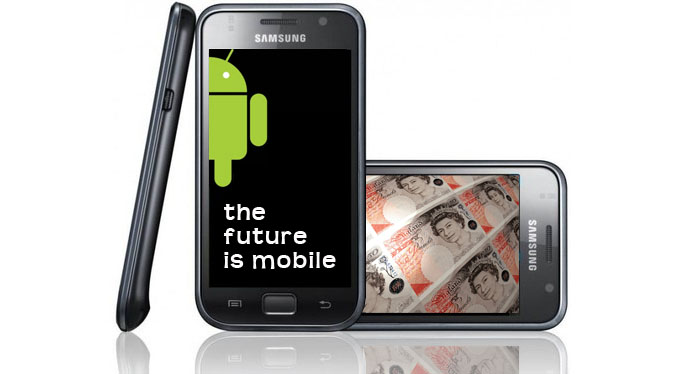
There has always been the view that internet shopping will kill off high street shops as consumers prefer the ease of browsing, comparing and paying online. If that's the case then why have eBay opened a physical store in Soho? Why do Amazon feel the need to promote a price check app by giving discounts to users who view products in real life and then buy online from Amazon? Why has Waitrose filled its shop window with QR codes for John Lewis products? What prompted Ocado to open a virtual store in a busy London shopping mall?
It seems the internet has not killed off traditional shopping. Whilst some stores do manage to sell products cheaper online, the 'want it now' mentality of high street shoppers has proved too hard to break. People would rather pay that bit extra than wait for something they've ordered online - especially if the online saving is reduced or cancelled out by the price of shipping. Despite doom and gloom news reports the decision to shop virtually or on the high street seems to be more affected by the weather than which is easier or cheaper. If you had braved shopping in Brighton this weekend you wouldn't think high street shops were doing badly at all!
That is why Amazon are trying to piggy back sales off other shops. Their Price Check deal - scan a product in a shop using Amazon's Price Check iPhone app, compare it to Amazon's price, buy it from Amazon and save $5 off a purchase - shows that consumers still need that physical touch.
Despite the wealth of possibilities available to retailers, few have a dedicated mobile developer. Only with a comprehensive mobile development course will developers have the skills and the knowledge to design and create successful apps from scratch and market them in app stores. Why pay out time and time again for new apps and for changes to apps when a one-off Android Training or iOS Training course delivers the necessary skills? Each training course last 5 days and combines a comprehensive overview of designing apps along with hands-on practice for Android (mobiles and tablets) or iOS devices (iPhones, iPads etc.) and is perfect for developers who are willing to enter the exciting and lucrative world of mobile app design.
Why Online Retailers Need a Physical Presence
Increasingly, online and high street retailers are switching to mobile app technology. Almost all retailers from independent clothing stores to giants like Asda, have an online presence and some form of web shop. Yet, an online shop is relatively limited. Users can see photos, videos, descriptions and reviews of items and can compares prices and product details easily due to price and product comparison websites. However, the physical feel of the product and a working demonstration - whether it is the quality of a TV or the fit of a t-shirt - is missing.
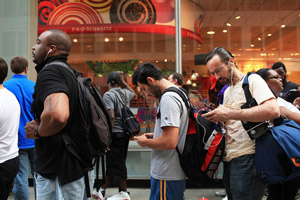
Consumers are using mobiles while shopping
There is no way to test products on Amazon, eBay or Ocado without going into a shop first. Once there, consumers are likely to just buy the product for the convenience of having it immediately and quite possibly the sales pitch from the sales assistant. By providing apps that allow consumers to buy products online while viewing them in real life (and giving them more money off in the process in Amazon's case) combines virtual and physical shopping.
Mobile tech is not just changing the way we shop. It's also changing how we search and how we interact with technology.
While Amazon have used an app to bridge the gap to physical products, others have gone for opening stores that you can scan and pay for items using your mobile and have them delivered to your door. However, the reason internet shops work well is the ability to have such enormous quantities of stock - by hitting the high street they are limited by shop space like any other retailer. This is a problem that high street stores already face, so how can they use mobile apps to combat decreasing floor space and increasing rent costs?
Why Bricks and Mortar Retailers Need Mobile Apps
The use of mobile apps bridges the gap between a physical product and online stores that can house masses of stock. Users can browse products in person, order them online using their mobiles and then have them delivered to their door or pick them up next day. It's a bit like taking Argos to the next level - instead of a catalogue there are physical products with QR codes or even giant wall and window displays with large images of items and descriptions.
Buying something on a mobile in a shop has the feeling of 'buy it now' with the lower cost of shopping online. Shops that allow consumers to purchase items on their phones can combat low stock problems as any out of stock products can be ordered. Items can be ordered in a variety of sizes and colours as well.
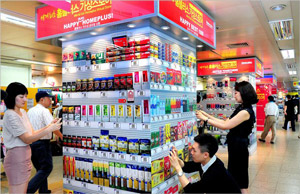
Example of a mobile supermarket
Mobile technology also allows giant retailers than need huge shop floors to sell their products in smaller, more expensive areas such as shopping malls. Tesco could never fit all their stock in a shopping mall as they require both large floor space and backroom storage. In a similar move to Ocado they have trialled a virtual store in Asia that allows people to scan barcodes and have products delivered to their homes. Read on to find out why Ocado have done this in the UK.
There are unprecedented possibilities of using mobile technology for shopping and over the next few years any brand or commerce business that hasn't grabbed a place in the mobile market will sorely miss out.
Here are 5 of our favourite uses of Mobile Apps for shopping so far:
1. Waitrose Brighton - Virtual Shop Front

Just in time for Christmas, Waitrose in Brighton has become the first 24 hour, virtual, mobile shop in Britain. Waitrose's Brighton shop front has become a virtual store for its partner chain John Lewis. This is a ground breaking way to get consumers shopping - you see what you want, scan it with your phone, buy it online and then collect in-store.
The items in the display are currently John Lewis' "top 30 favourite things for Christmas" and is a way for John Lewis to make its mark in Brighton - where it doesn't currently have a store. There are currently 255 Waitroses to 36 John Lewis stores. By placing virtual John Lewis shops on or in every Waitrose they are massively increasing their reach across the UK. According to LeapFrog (whose offices are above Waitrose), the interest in the window has not been very high. We think this is due in part to the price of goods on sale and the external location of the site. Few people want to stand in a busy street, take out their iPhone and purchase a TV in front of a crowd.
However, Waitrose staff claim Click and Collect orders rose greatly with the instalment of the window so then signs are this technology could work. It also doesn't help that Waitrose customers are of an older disposition and so unlikely to know all the latest mobile apps.
2. eBay's West End Shop
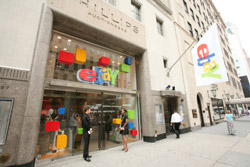
Another quick launch in time for Christmas, eBay have stepped out of your web browser and into a shop in Soho. The eBay store features a range of physical goods with QR codes instead of bar codes on their price tags. Buyers scan the code and are sent to the relevant eBay page to buy the product. Some people have questioned the logic of going into a shop to order something online but allowing shoppers to feel and look at products is fantastic. It also means that because the shop only needed 1 of each item they freed up floor space and were able to feature 350 of eBay's best selling items.
This sort of shopping could not take place without mobile technology. Using traditional web-based shopping would mean users would either have to write down product codes to use later or the shop would have to have terminals for shoppers to log in and purchase items. This would be a huge privacy concern as everybody would be entering personal shopping details on a public computer. The ability to use their own device makes people more comfortable about shopping online on the move.
3. Amazon Price Check - $5 Off Deal
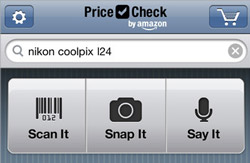
On Saturday, Amazon rolled out a promotion using its Price Check app. The app is designed to compare prices between in-store goods and Amazon's online catalogue. Amazon are already a threat to bricks and mortar retailers due to low prices but have now found a way to overcome the 'buy it now' urge.
If you check a price in-store and then buy on Amazon, they will give users $5 off per purchase, up to a total of $15. As if high street stores don't feel threatened enough already by the online shopping giant!
The Price Check App first appeared in 2010 and initially upset retailers as it allowed shoppers to compare products simply by scanning barcodes and taking photos of the front covers of books, DVDs and games and compare them to Amazon's prices - which are almost always cheaper that high street shops.
However, due to the 'want it now' mentality of shopping meaning a lot of shoppers are willing to pay a bit extra to take something home on the day rather than wait for it to arrive by post. After all, unless they go for free shipping - which can take up to a week - the price of next day shipping can be the same or more than the difference between buying in store or online.
Here's where a $5 off deal - making products even cheaper on Amazon - comes into play.
4. John Lewis Offer Free WiFi for Price Comparison
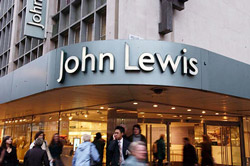
John Lewis has a reputation for being expensive. It is probably due to the fact it sells high quality products and has a very attractive shop display. However, they are keen to dispel the idea that they sell products for more than other shops.
Extensively advertising that fact with the slogan 'never knowingly overselling' hasn't seemed to work so John Lewis are now providing free WiFi in all their stores so that visitors can compare their prices online, in store. This is a very clever move by the retailer - if a shopper checks a price online and finds out John Lewis are the same price or cheaper they're already online, on their phone and are apt to tweet and share this news with others.
5. Ocado Virtual Shop
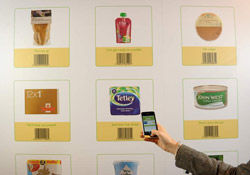
Ocado shocked retail experts this year when they brought their online supermarket into one of the UK's biggest shopping malls. "Supermarket, in a shopping mall? That won't work!" is what you are probably thinking. However, the reason supermarkets don't fit in malls is that people go there and spend a long time shopping so they can't be carrying around cold or frozen food - there is also an issue with high shop rent. However, Ocado's store is virtual. It is simply a wall of images with barcodes.
This means that when shopping for Christmas presents or that new pair of jeans you want, you can pop in to the Ocado virtual store, grab a virtual pint of milk and loaf of bread, and have them delivered to your house for when you get home. In practice this may not work as efficiently as that but in the future the possibilities are great for on-the-move grocery shopping.
Many consumers have said the idea of shopping for food using pictures is unpopular because they can't see the item but internet food shopping is a growing market - especially for those who don't drive and so can't carry a trolley full of shopping home with them. Ocado have simply brought their popular online service to physical shoppers. They have combined the easiest bits of shopping online - easy price comparison, your shopping arrives at your door - with the easiest bits of real life shopping - finding items easily and quickly adding them to your "basket".
What does all this mean for Mobile technology?
With both virtual and physical retailers embracing mobile apps to improve sales they clearly recognise mobile technology as the new battleground for sales. It is more important than ever for developers to expand their knowledge to mobile to meet the demand for consumer apps. Make sure you check out our range of Mobile Development Courses and become equipped for the future of mobile.
